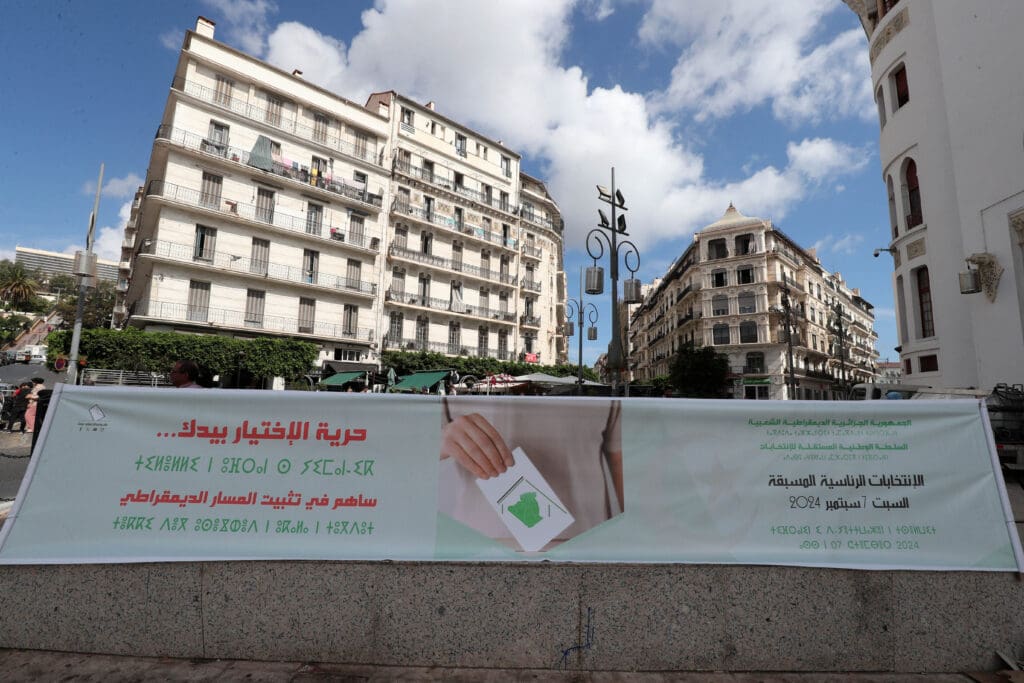On September 7, Algerians will head to the polls to elect their president. The outcome, however, is already a foregone conclusion. President Abdelmadjid Tebboune, running for his second term, is certain to win. Tebboune’s continued rule is assured because the military, the true power brokers in Algeria, have deemed him a suitable figurehead. His initial appointment and now his re-election are only possible with the support of the military leadership, first under Chief of Staff Ahmed Gaïd Salah and now his successor Saïd Chengriha. Elections in Algeria are tightly controlled affairs, ensuring the perpetuation of the existing power structure. With the political status quo seemingly entrenched, the crucial question is: what do the next five years hold for Algeria and its people?
National Level: Popularity on Shaky Ground
Tebboune’s initial tenure was marked by public distrust and a lack of legitimacy. He came to power after the 2019 Hirak protest movement toppled his predecessor, Abdelaziz Bouteflika, but struggled to gain real concessions from the regime. Since then, however, a mix of proactive policy decisions and fortunate events have boosted his popularity. Taking office on the cusp of the COVID-19 pandemic, Tebboune was able to leverage the crisis to end the protests and initiate popular measures such as offering debt forgiveness for young people who contracted loans from the National Agency for Support of Youth Employment (ANSEJ) program, designed to support young entrepreneurs. He also introduced an unemployment allowance, which targets those who have never worked before, providing critical support to 1.5 million young people.
The war in Ukraine provided a further boost to Algeria’s economy. As Europe sought alternatives to Russian gas, Algeria was able to double its exports, reaching 100bcm in 2022—a first since 1999 after more than a decade of stagnation. The economic growth rate exceeded 4% in 2023 for the first time since 2014, and the exchange reserves rose to $70bn in 2023 after falling at $62bn the previous year.
This generated much-needed revenue, enabling Tebboune to continue to expand upon his popular initiatives, with the most recent one being raising salaries and pensions for 2.8 million civil servants, which he declared will be sustained through 2026 and 2027. Coupled with his anti-corruption efforts, these policies have garnered him more legitimacy and popularity, particularly among young people, many of whom affectionately call him “A’amu Tebboune” (Uncle Tebboune).
Despite the rise in public support, Tebboune’s policy changes are built on a fragile foundation that will sooner or later be tested by the country’s structural weaknesses. Algeria’s economy remains heavily reliant on hydrocarbons, which account for 93% of product exports and 38% of budget revenues. This means the entire country is vulnerable to fluctuations in global oil and gas markets. Despite the urgent need to accelerate private sector investment in non-hydrocarbon sectors, promises to diversify the economy remain unfulfilled.
The government has made efforts to attract foreign investment through measures such as the 2022 Investment Law, the 2023 Banking and Monetary Law, and the formal adhesion to the Africa Continental Free Trade Agreement. However, an unattractive business environment mired in red tape continues to deter investors. In 2022, foreign direct investment plummeted by 91.3%, indicating waning investor confidence. With public investment increasingly limited by public spending, strengthening efforts to attract private investment is critical for Algeria’s future growth.
Meanwhile, ordinary Algerians continue to grapple with high inflation, although it has decreased to 6.1% in June 2024 from 9.3% in the same period last year. The sharp rise in food prices, however, particularly for fresh produce (+22.1%) in 2023, had a disproportionate impact on the poorest 40% of the population, for whom food represents over half of their expenses.
Despite a glimmer of hope with fruit and vegetable prices starting to fall in 2024, inflation remains a significant challenge. Algerian employees have seen their hard-earned wages dwindle over the past 25 years, with a recent study revealing a shocking 60% decline in their purchasing power. This persistent erosion in the value of money threatens to undermine Tebboune’s recent gains in popularity and create fertile ground for social unrest in the years to come.
International Level: Stalled Progress and Regional Isolation
Algeria seemed poised to break its diplomatic isolation in 2022, hosting successful events like the Mediterranean Games and the Arab League summit. The war in Ukraine further elevated Algeria’s profile, with European leaders making numerous visits to secure gas supplies. Despite Tebboune’s diplomatic overhaul, which included the creation of more than 70 new diplomatic and consular posts and the appointment of seasoned diplomats to key positions, Algeria’s foreign policy initiatives have yet to yield meaningful results. Its inability to significantly impact the Libyan crisis is glaring. With neighboring Morocco, relations have deteriorated to what President Tebboune himself has called a “point of no return.” Morocco’s strategic maneuvering has secured crucial support from the United States, Spain and, recently, France, on the contentious Western Sahara issue. This latest diplomatic victory for Rabat has triggered a fresh wave of tension between Paris and Algiers, leading to the recall of the Algerian ambassador from the French capital and a complete severing of official communication channels. Meanwhile, Morocco continues to deepen its ties with Israel, even in the face of the genocide it is perpetrating in Gaza. In stark contrast, Algeria, rightly so, continues to be a vocal advocate of Palestinian statehood and condemns Israel actions. Yet, while Tebboune’s strong rhetoric and hints of military intervention in Gaza resonate domestically, they offer little in terms of tangible policy shifts.
The diplomatic challenges are not limited to Morocco. Algeria’s relationship with its Sahelian neighbors also reached a critical juncture, further complicating its regional standing. Tensions with Niger and Mali have escalated. Niger accuses Algeria of mistreating migrants, while Mali has taken the drastic step of recalling its ambassador, accusing Algeria of meddling in its internal affairs and supporting Tuareg rebels. This move effectively buried the 2015 Algiers Accord, a peace agreement aimed at stabilizing the region. Even the Economic Community of West African States (ECOWAS) has joined the chorus of criticism, alleging Algeria’s complicity in enabling Russia’s Wagner Group mercenaries in the Sahel.
Algeria finds itself increasingly sidelined, struggling to maintain its traditional role even as a mediator in the Sahel. Its leverage seems confined to Tunisia, itself facing internal turmoil. The country faces an uphill battle to regain regional influence and navigate a changing regional and global order. Last year, Algeria failed in its bid to join the BRICS+ economic bloc, a major blow considering fellow North African country, Egypt, was admitted despite its own dire economic troubles. Algeria was, however, offered the consolation prize of admission to the BRICS’s New Development Bank on September 1, 2024.
Algeria: a Predictable Future ?
The forthcoming elections in Algeria are unlikely to bring about significant change. The ruling elite will likely maintain their grip on power, ensuring continuity but offering little hope for meaningful progress. The deep-rooted structural issues, from economic dependence on hydrocarbons to limited political freedoms and political and diplomatic stagnation, are likely to persist.
While the regime might achieve short-term stability through this orchestrated political dance, it would be unwise to underestimate the agency of Algerians. The Hirak protests, where millions once marched each Friday, might be a thing of the past for now but the underlying frustrations remain. The question lingers: can this enforced quietude last? Or will the Algerian people once again find their voice, demanding the change they so desperately crave?


